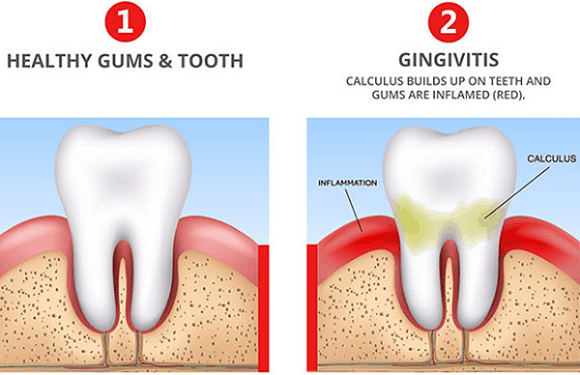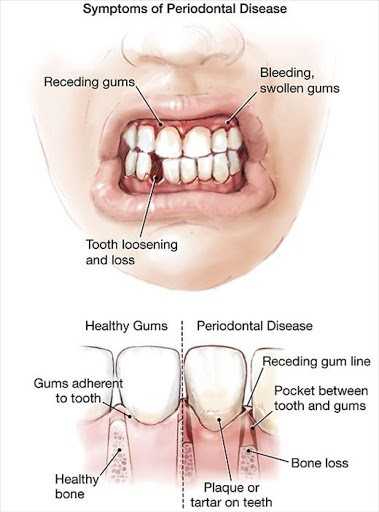What is gum disease?
Gum disease means pain and infection of the teeth supporting tissues. There are mainly two forms of gum disease: gingivitis and periodontal disease.
What is gingivitis?
Gingivitis inflammation appears in gums. This is when the gums around the teeth turn red and swollen. This swollen gum often bleeds when you are brushing.

What is periodontal disease?
When gingivitis stays for a long time in the mouth they can turn into periodontal disease. There are various types of periodontal disease that affects the gums and tissues that support the teeth.
As the disease continues the bone anchoring the teeth in the jaw can be lost. This makes the tooth loose from the socket. If it is left untreated teeth may eventually fall out. In fact, the more people lose their teeth through periodontal disease than through tooth decay.
How can I know if I have the risk of Gum disease?
Many people suffer from some form of gum disease, and it is the major cause of tooth loss in adults. However, gum disease spread slowly. If it is treated in time then your teeth and gums can be saved. So the best idea is to get regular dental checkups that will help to identify any oral risks.

What bleeding gum indicates?
This symptom indicates the existence or risk of gum diseases. It may be due to inadequate plaque removal from the teeth at the gum line. This situation will lead to a condition called gingivitis (Inflamed gums). If the plaque is not removed at this stage, it may turn into tartar and lead to increased bleeding due to gum and jawbone disease known as ‘Periodontitis’.
What is the cause of gum disease?
All gum disease is caused by plaque. Plaque is produced by bacteria which forms on the outer layer of the teeth and gums every day. Most of the bacteria in plaque do not harm but some of that has been found to be the main cause of gum disease. To prevent gum disease, you need to remove all the plaque every day by brushing and flossing.
How will smoking affect my gums and teeth?
Smoking can worsen gum disease. People who smoke are more likely to produce more bacterial plaque. The gums will be affected because smoking causes a lack of oxygen in the bloodstream.
So the infected gum is unable to heal. Smoking allows to form more dental plaque and this causes gum disease to progress more quickly than in non- smokers. However, it still remains the most common reason for tooth loss in adults.
What happens if gum disease is not treated?
Unfortunately, gum disease develops without showing any signs of pain so you do not notice the damage. However, bacteria are sometimes more active and cause soreness.
Further, it can lead to gum abscesses, and pus may ooze from gum tissues and surrounding bones. As the disease continues over the years supporting bone will be damaged and teeth can be lost. If the disease is not treated for a long time, treatment can become more difficult.
How do I know if l have gum disease?
The first sign of gum disease is blood while you brush or rinse. You may find blood also when you are eating, leaving a bad taste in your mouth. You may notice an unpleasant breath also.
What do I do if think I have gum disease?
The first thing to do is to visit your dentist for a dental check-up. The dentist can measure the ‘cuff ‘ of gum around each tooth and can see if there is any sign that periodontal disease developing. X rays may also be incorporated to see the amount of bone has damaged. This assessment is very important, so the correct treatment can be prescribed then after.
What treatments are needed?
Your dentist will usually clean your teeth. They will also remove plaque by cleaning all surfaces of your teeth thoroughly and effectively. This may take a few sessions with your dentist.
What else may be needed?
Once your teeth are clean, your dentist may start further cleaning the roots of the teeth, to ensure that the last pockets of bacteria are removed. This is also known as root planning. You may need the treatment area to be numbed before the procedure. Afterward, you may feel some discomfort for up to 48 hours.
Can I get Periodontitis again even though I’ve cured it the last time?
Periodontal diseases are never cured. But as long as you maintain oral care further loss of bone will be very slow and it may stop altogether. However, you must remove plaque every day, and go for regular check-ups to the dentist.
Reference:
Expert opinion
Dr. Priyanka Shinghore Dental Director at Sabka dentist says “People often fail to identify the beginning signs of gum disease. A regular dental check-up allows your dentist to examine through the mouth and is highly recommendable to prevent any oral diseases.”
Dr. Rupali Gujar Dental Director at Sabka dentist says “Smoking has bad effects on your mouth & body in several ways. The main effect is it decreases saliva production. Saliva helps to eliminate acid produced by bacteria in the mouth.”










